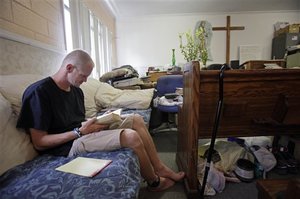By Alysia Patterson
Belleville News-Democrat
October 8, 2009
http://www.bnd.com/breaking_news/story/956276.html
 |
| Convicted sex offender James Nichols studies scriptures at the New Life Mission Church Wednesday, Sept. 23, 2009 in Fayetteville, N.C. Nichols said he was trying to better himself by going to Moncure Baptist Church in Moncure, N.C. But the police who arrested him explained: The church is off-limits because it has a daycare center. - AP Photo |
RALEIGH, N.C. -- Convicted sex offender James Nichols said he was trying to better himself by going to church. But the police who arrested him explained: The church is off-limits because it has a daycare center.
Now Nichols is challenging North Carolina's sex-offender laws in a case that pits the constitutional right to religious freedom against the state's goal of protecting the public from child molesters.
"I just started asking the question, 'Why? Why am I being treated this way after trying to better myself?'" said Nichols, a 31-year-old who was twice convicted of indecent liberties with a teen girl and again in 2003 for attempted second-degree rape. "The law gives you no room to better yourself."
At issue in Nichols' case and a similar one in Georgia are day care centers and youth programs at houses of worship where sex offenders can come into proximity with children. Sex offender advocates agree some convicts should not be allowed around children, but they contend barring all offenders denies them support needed to become productive citizens.
"Criminalizing the practice of religion for everyone on the registry will do more harm than good," said Sara Totonchi, policy director for the Southern Center for Human Rights. "With these laws, states are driving people on the registry from their faith community and depriving them of the rehabilitative influence of the church."
Thirty-six states establish zones where sex offenders cannot live or visit. Some states provide exemptions for churches but many do not.
In December, North Carolina state legislators barred sex offenders from coming within 300 feet of any place intended primarily for the use, care or supervision of minors.
Three months later, Nichols was arrested at his home after attending Sunday services. He said he was "floored" to learn that he had been picked up because Moncure Baptist Church has a child-care center for families attending services.
"I believe wholeheartedly if it wasn't for God, I don't know where I'd be today," he said. "God's blessed me with learning how to live a better life."
In Georgia, the Southern Center for Human Rights sued the state in part because the law there prevents offenders from volunteering in places of worship. The lawsuit brought on behalf of Georgia's 16,000-plus registered sex offenders is pending in federal court.
Katherine Parker, legal director for the ACLU of North Carolina, said she was not aware of religion-based challenges to sex-offender laws in any other states. The ACLU is helping in Nichols' case.
Jonathan Turley, a law professor at George Washington University, said preventing offenders from attending religious services is another in a series of increasingly unforgiving laws adopted across the country. Some of the laws have pushed offenders out of homes and entire communities.
"This case is part of a much larger group of cases dealing with the expansive sex-offender laws," Turley said. "The state cannot sentence someone to a life of being an agnostic or an atheist without violating the constitution."
Some question whether the restrictive laws will lead to more crime.
"It's not clear that there's any public-safety purpose to these laws. They continue to ostracize previous sex offenders in a way that could be dangerous in the end," said Sarah Tofte, a legal researcher with Human Rights Watch. "If they can successfully transition to the community, to include going to church, they are less likely to reoffend."
Some lawmakers say offenders such as Nichols should blame themselves for breaking the law in the first place.
"I'm not denying him the right to go to church. He denied himself that," said state Sen. David Hoyle, the Democrat who sponsored the North Carolina bill. "If they are a convicted pedophile, they have given up a lot of their rights."
Church leaders feel caught between leading houses of worship where broken people can seek help and preventing criminals from exploiting a place of trust.
Joseph Green, pastor of a church that Nichols attended after his arrest, reached out to him while at the same time assuaging the concerns of his parishioners.
"I told him as long as he's honest with me, then we're willing to embrace him and help him focus and get his life back on track," Green said. But, he added, "The Bible talks about wolves coming in in sheep's clothing, so I've got to be watchful over everyone coming into my church."
Most church members were welcoming. "I think everybody deserves a chance," said Shawn Cox, 28, a married father of two who says his faith helped steer him away from drug dealing and crime.
"God turned my life around," said Cox. "I'm not saying that you bring the guy in and put him over the youth program or the youth ministry as soon as he walks in the door. But there's no way he can overcome these things without help and support."
Any original material on these pages is copyright © BishopAccountability.org 2004. Reproduce freely with attribution.